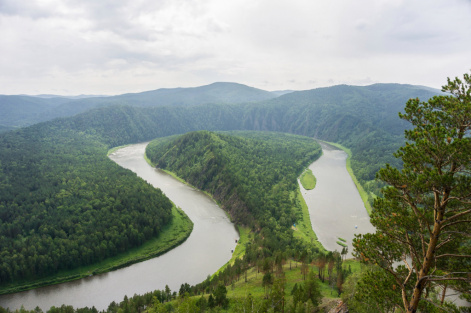Scientists have predicted how global warming will influence the climate in Siberia
10 June 2019 г.

"If the emissions of greenhouse gases are not stopped, the temperatures in January in Siberia will increase by ten degrees Celsius, July will be 5,7 degrees warmer, and the precipitation level will increase by 140 mm. As a result, the climate will have become milder and the area of permafrost will have decreased by 25 per cent by 2080 ", says Yelena Parfenova , a researcher fr om the Sukachev Institute of Forest SB RAS.
The Arctic, along with mountain glaciers, remains one of the regions most vulnerable for global warming. In the last years the average annual temperatures in the polar regions have already increased by six-seven degrees. Scientists believe that in the future the melting of arctic ice will influence the circulation of currents and lead to irreversible changes of the global climate.
Two phenomena are said to be the main consequence of warming: the displacement of climatic belts (and, consequently, migration of flora and fauna) and the changes in coming seasons. It has recently been revealed that in the arctic regions of Russia and Canada spring comes two-three weeks earlier than before and the rate of permafrost melting and speed of the retreat of glaciers has actually increased twice.
On the one hand, as Yelena Parfenova and her colleagues say, these processes will negatively influence the existing arctic infrastructure and can lead to critical biases in ecosystems. On the other hand, climatic changes can facilitate the life of people, since winters will become less severe and soils, becoming more available for agriculture, will give more harvest. As a result, the regions of East Siberia, Far East, Alaska and Canadian Arctic regions can become more attractive for people than the south wh ere heat and drought will dominate.
On the basis of this idea, American and Russian researchers have made an attempt to estimate how the life in the Asian part of Russia will change. For this purpose they have used current climatic models and two main scenarios of the events developed by the UN Intergovernmental Panel on Climate Change (IPCC).
The scientists have combined these predictions with socio-geographical maps of Siberia and Far East created by Soviet geographers and economists. According to climatologists, these regions are characterized by the absence of areas with "favorable" and "most favorable" conditions.
However, they will appear even if the emissions of greenhouse gases are limited as much as possible. Thus, the population density in the Asian part of Russia can increase by five times, as well as the interest to these areas, and the regions unsuitable for life will decrease to 50 per cent.
If the world community does not stop the emission of greenhouse gases, the climate in the Far East and Siberia will be more favorable. According to the calculations of scientists, in this case, one third of the area will be suitable for life.
"The Asian part of Russia remains one of the coldest places on the Earth. In the future when the climate is warmer, the productivity of these lands and their ability to provide conditions for people’s life will considerably increase. However, now Siberia and the Far East lack the appropriate infrastructure which could be the basis for the fast development of these regions", says the climatologist in conclusion.
However, earlier, the Krasnoyarsk scientists considered various aspects of the climate impact on the life conditions in Siberia and admitted that the consequences could be ambiguous. The researchers of the Krasnoyarsk Science Center have informed the internet news agency “Science in Siberia” about the influence of global warming on the nature and conditions of life in Siberia.
Share:
